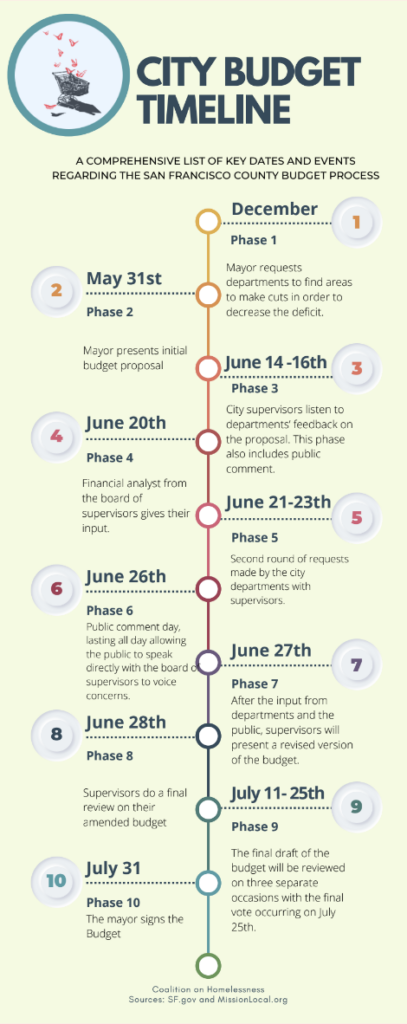by Solinna Ven, Renee Tian and Eliza Cieutat
Mayor London Breed’s budget proposal for fiscal years 2024-25 and 2025-26 has sparked significant controversy and is raising important questions about the city’s direction in addressing public safety, social services, and community well-being.
At the heart of Mayor Breed’s budget proposal is a notable increase in funding for law enforcement agencies, including the Police and Fire departments, District Attorney’s office and the Department of Emergency Management. The proposal allocates a staggering $100 million increase and includes provisions for salary raises, incentive packages, retention increases, and increased SFPD surveillance cameras and data collection.
Breed also proposed significant cuts to several vital social service programs and nonprofit organizations that play crucial roles in supporting vulnerable populations within San Francisco. The San Francisco Department of Children, Youth, and their Families (DCYF) faces a substantial reduction of $2.9 million in funding, particularly impacting school violence prevention programs. Additionally, the Department of Public Health (DPH) is facing a cut of $9.8 million in FY 2025-2026 which will affect mental health and substance use services in shelters and housing, as well as outpatient programs critical for community well-being. One of the most contentious cuts includes an up to 50% reduction in funding for the Emergency Rental Assistance Program (ERAP), which has been instrumental in preventing evictions and providing stability for households facing financial hardship.
As San Francisco approaches a critical point in the budget cycle, families, activists, and concerned citizens gathered at City Hall on June 24 to make their voices heard. Vanessa Bailey, a mother and resident of the Bayview District, spoke on the importance of funding for family and youth resources in underserved communities such as her neighborhood.
“Programs that cater to [children’s] needs, such as after-school programs, mentorships, and community service centers, play a crucial role in providing them a safe and nurturing environment to thrive,” she said. “The consequences of such [budget] cuts are a direct blow to the aspirations and dreams of working-class families and our inner-city youth. They are denied access to educational resources, extracurricular activities, and opportunities for personal growth.”
Others echoed similar sentiments regarding the impact of this budget proposal on vulnerable communities. Shellena Eskridge, executive director of the Homeless Prenatal Program, addressed the Budget and Finance Committee at the Board of Supervisors, citing the need for permanent supportive housing, rental vouchers and subsidies, and shelter beds.
“I can tell you as a service provider: There is nothing worse than having to turn away a pregnant person or a person with small children, informed that they have to sleep in their car or turn to the streets,” Eskridge told the panel. “Please continue to invest in families.”
The following day, many participants expressed similar concerns during the public Beilenson hearing, which is required under the California Health and Safety Code to discuss any proposed reduction in public health services. The hearing was about the mayor’s proposal to reduce the Sugary Drinks Distributor Tax by $1.88 million, which would eliminate five food educational and advocacy programs. GLIDE policy associate Shiba Bandeeba discussed the importance of soda tax-funded programs to educate and advocate for healthy eating across the city, especially in ensuring that Black community members have a voice in addressing health disparities.
“Most marginalized residents have been heavily reliant on [community-based organizations] that provide food services like [GLIDE’s] meals program,” she said. “But even those programs don’t address the overall demand, nor the structural root causes of the varying health disparities. The Soda Tax Task Force recommends that these funds be used solely for community-driven solutions and interventions that support the overall quality of life among historically marginalized San Franciscans. Education is prevention.”
Like the Black community, Pacific Islanders in San Francisco also face disproportionate health disparities. Tina Faitala, program coordinator of All My Usos, spoke on proposed reductions’ devastating impacts on programs that previously distributed healthy and culturally relevant food and nutrition resources if All My Usos loses its grant funding.
“We are now left wondering who will tell our people that services that help keep them alive will no longer be offered due to budget cuts,” she said. “Remember these cuts, because our community will.”
Throughout the hearings, a common refrain from the general public has been the significant impact on San Francisco’s more vulnerable communities. District 11 Supervisor Ahsha Safaí echoed such concerns. He pointed out the effects that cuts would have on neighborhoods in his district, such as Crocker-Amazon, Visitacion Valley and the Excelsior District. He also said that other neighborhoods such as Bayview-Hunters Point, the Tenderloin, the Mission, Potrero and South of Market would bear the brunt.
“Those are all the neighborhoods in the city that need food education activities the most, and we’re taking it away,” Safaí said. “It just doesn’t make sense to me. We have an overdose crisis that is climbing by the day, and we have food insecurity and food education that is completely being undermined by this action.”
Residents, advocates and public officials engaged in robust debate throughout this process, emphasizing the diverse needs of the public. Recurring themes of equity and justice, as well as balancing community well-being with public safety, underscored these discussions.
Activists often say that budgets are moral documents. The outcomes of these budget discussions would not only determine financial priorities but also reaffirm San Francisco’s values as a city dedicated to fostering resilience, compassion, and opportunity for all.


